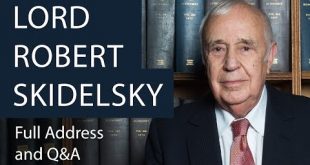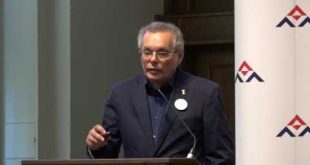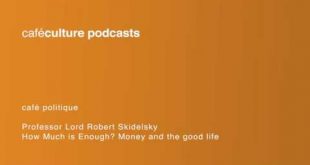LONDON – The question of the West’s relationship with Russia has been buried by media stories of hacking, sex scandals, and potential blackmail. The dossier by former British spy Christopher Steele about US President Donald Trump’s activities in Moscow some years ago may turn out to be as credible as the claims that Saddam Hussein possessed weapons of mass destruction – or it may not. We simply don’t know. What is clear is that such stories have distracted attention from the task of bridging...
Read More »Lord Robert Skidelsky | Full Address and Q&A | Oxford Union
SUBSCRIBE for more speakers ► http://is.gd/OxfordUnion Oxford Union on Facebook: https://www.facebook.com/theoxfordunion Oxford Union on Twitter: @OxfordUnion Website: http://www.oxford-union.org/ Baron Skidelsky, FBA is a British economic historian. He is the author of a three-volume award-winning biography of British economist John Maynard Keynes. Skidelsky read history at Jesus College, Oxford, and is Emeritus Professor of Political Economy at the University of Warwick, England. ABOUT...
Read More »Economists versus the Economy
LONDON – Let’s be honest: no one knows what is happening in the world economy today. Recovery from the collapse of 2008 has been unexpectedly slow. Are we on the road to full health or mired in “secular stagnation”? Is globalization coming or going? Policymakers don’t know what to do. They press the usual (and unusual) levers and nothing happens. Quantitative easing was supposed to bring inflation “back to target.” It didn't. Fiscal contraction was supposed to restore confidence....
Read More »A Farewell Concert for Robert Skidelsky
Alexei Grynyuk performing......... Andante Spiniato and Polonaise Brilliante in E flat Major, Op.22 F. Chopin Mephisto Waltz No. 1 F. Liszt Nocturne in E flat Major, Op. 9 F. Chopin Sonata in B Minor F. Liszt
Read More »Autumn Statement: Economy
My Lords, it is always a great pleasure to follow the noble Lord, Lord Desai. I will take up one or two things he said, but a preliminary question that occurred to me is: if the private sector is so flush with money, why is it not investing more of it? Why does it need government help to do so? The answer that occurs to me is that the private sector does not see sufficient demand to justify the kind of investment that would employ those funds that are sitting idle. I will come to...
Read More »Speech on the Economy: Currency Fluctuations
Volume 776 12.55 pm My Lords, I, too, thank the noble Baroness, Lady McIntosh, for making this debate possible. The most dramatic economic effect of the United Kingdom’s Brexit vote has been the collapse of sterling. Since June, the pound has fallen by about 16% against a basket of currencies. Mervyn King, the former Governor of the Bank of England, has hailed the lower exchange rate as “a welcome change”. Indeed, with Britain’s current account deficit in the order of 7% of...
Read More »Keynes and Brexit
John Maynard Keynes would have been conflicted by the referendum. Culture pulled him towards Europe; politics and especially the continent’s current austerity economics would have pushed him increasingly away. Churchill talked about the “three majestic circles” of the Commonwealth, the United States and Europe. But over Keynes’s lifetime, the reality was that Britain was firmly locked into only two of them: the special relationship with the US, and its own imperial preference...
Read More »Lord Robert Skidelsky on Keynes’s General Theory at the Gdansk University of Technology
: Prof. Lord Robert Skidelsky lectured on Keynes's General Theory of Employment, Interest, and Money on 10th May 2016 at Gdańsk University of Technology. The lecture was a part of the fourth instalment of Economy/Culture/Values Conference, organized by the Faculty of Management and Economics since 2013. The lecture was to commemorate the 80th anniversary of publication of Keynes's groundbreaking work and reconsider its significance and influence on both today's economy and economics.
Read More »Slouching Toward Trump
LONDON – The Republican establishment has gone into overdrive to present President-elect Donald Trump as a guarantor of continuity. Of course, he is nothing of the sort. He campaigned against the political establishment, and, as he told a pre-election rally, a victory for him would be a “Brexit plus, plus, plus.” With two political earthquakes within months of each other, and more sure to follow, we may well agree with the verdict of France’s ambassador to the United States: the...
Read More »Episode 26 – How Much is Enough? Money and the good life – Robert Skidelsky
What is the true value of money? What is a good life? Do we work long hours merely to make more money? Professor Lord Robert Skidelsky, Warwick University, will address these questions and others, drawing on examples from his recent book to explore the existence of the good life and how we can strive to live it. For more info on events please check out our website http://www.cafeculturenortheast.org.uk Or Follow Us on Facebook https://www.facebook.com/cafeculturenortheast/?fref=ts
Read More » Robert Skidelsky
Robert Skidelsky




